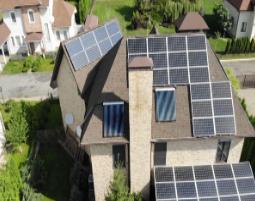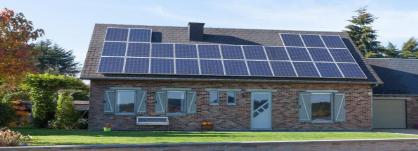As humanity embraces green living, homes are looking into alternate energy sources, with solar power emerging as a contender. Aside from its environmental benefits, solar energy may be a wise financial investment, providing various benefits beyond carbon footprint reduction. In this post, we will look at the economic benefits of residential solar systems, explaining how they may save you money and provide significant returns on your investment.

Immediate Cost Savings on Energy Bills
The huge reduction in energy costs is one of the most apparent and immediate financial benefits of installing solar panels on your house. Solar power systems create electricity from sunshine, allowing you to generate energy and remove or minimize your need for grid power. As a consequence, your monthly energy bills will decrease noticeably, offering instant relief to your household budget.
Return on Investment (ROI)
While the cost of installing solar panels may appear to be expensive at first, it is crucial to view it as a long-term investment rather than an expense. Solar panels may last up to 25 years, and many homeowners get a big return on their investment quickly. Government incentives, tax credits, and rebates make solar systems more financially viable, resulting in a faster ROI. Homeowners may choose to fit their budget and financial objectives by carefully weighing these economic issues.

Increased Property Value
Investing in solar solutions not only saves money on electricity but may also increase the value of your home. According to studies, properties with solar panels sell faster and for a greater price than non-solar equivalents. Potential purchasers are increasingly interested in energy-efficient houses, and a solar power system adds a desired feature that distinguishes your property. When it comes time to sell your home, the rise in property value may be a lucrative return, making solar systems a wise financial decision.
Net Metering and Excess Energy Production
Net metering is a critical component of the financial benefits of solar electricity. Many utility providers have net metering schemes, which allow homeowners to get credits for the extra energy produced by their solar panels. When your solar system creates more power than your home utilizes during peak sunshine hours, the excess is routed back into the grid. In exchange, you will earn credits that may be used to offset your power costs when your solar panels are not actively producing energy, such as at night or on cloudy days. By exploiting extra energy output, this agreement enhances the financial benefits of your solar investment.
Environmental Credits and Incentives
Aside from immediate energy bill reductions, homeowners may optimize their financial advantages through environmental credits and incentives. Solar Renewable Energy Credits (SRECs) are available in some areas, allowing homeowners to earn marketable credits for the renewable energy generated by their solar panels. Utilities or other businesses seeking renewable energy can purchase these credits. Furthermore, firms and people devoted to sustainability may provide incentives or discounts for ecologically friendly actions, opening up a new route for financial benefit.
Conclusion
The financial benefits of home solar solutions extend far beyond the initial investment. From immediate cost savings on energy bills to long-term returns on investment, increased property value, net metering advantages, and environmental credits, solar power offers a multifaceted approach to financial prosperity. As technology advances and solar installations become more accessible, homeowners can harness the power of the sun not only to contribute to a greener planet and enhance their financial well-being. Investing in home solar solutions becomes a strategic move that pays off in the short and long run by understanding and leveraging these economic benefits.